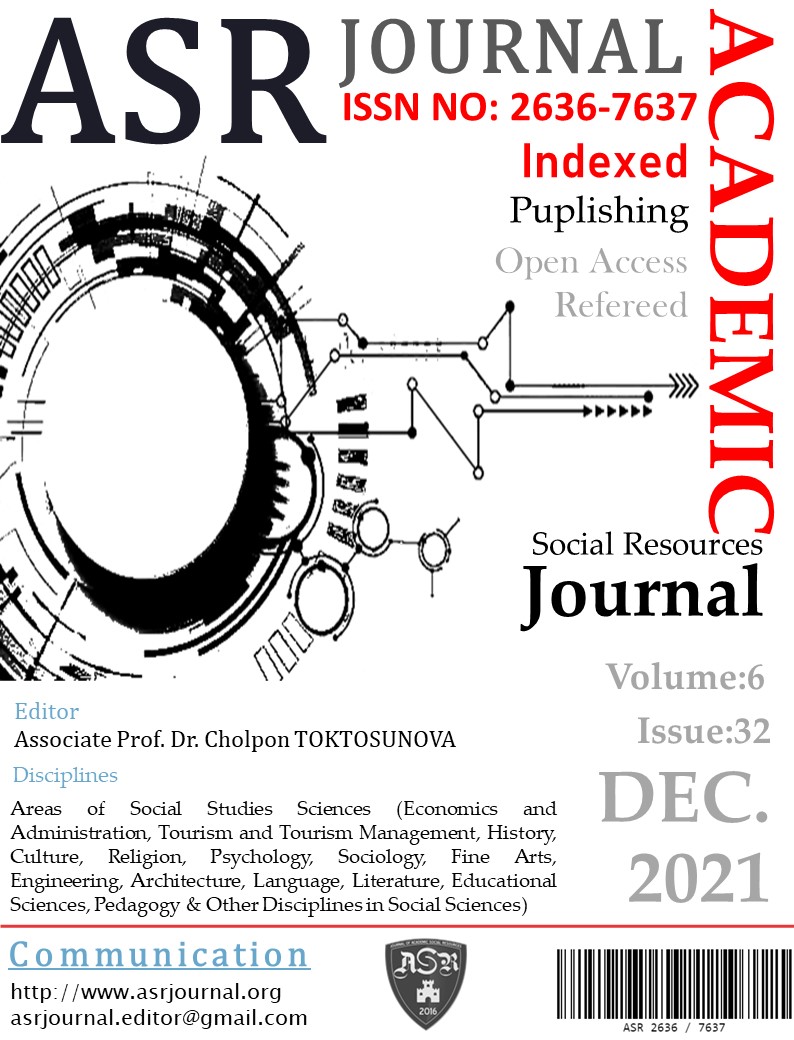Author :
Abstract
Dünya Sağlık Örgütü (WHO) tarafından 11 Mart 2020 itibariyle Covid-19 salgını pandemi olarak ilan edilmiş ve aynı tarihte Türkiye’de ilk vaka kayıtlara geçmiştir. Salgını kontrol altına almak adına tüm ülkeler başta sağlık olmak üzere ekonomi ve maliye alanlarında farklı politikalar uygulamış, sokağa çıkma kısıtlaması, bazı sektörlerde faaliyetin tamamen durdurulması, uzaktan çalışma, uzaktan eğitim gibi tedbirler almışlardır. Teknolojik gelişmelere bağlı olarak ön plana çıkan dijital dönüşüm kavramı bu süreçte eğitim ve bankacılık başta olmak üzere birçok faaliyet alanı için zorunlu olarak uygulanmıştır. Dijital dönüşüm sürecine en hazırlıklı sektörlerden biri olan bankacılık sektöründe, pandemi sürecinde gerek mevcut teknolojilerinin kullanımı gerekse yeni teknolojilerin uygulanması ile iş yapış şekillerinde önemli farklılık yaşanmıştır. Bu çalışmada Covid-19 pandemi sürecinin bankacılık sektörüne ve banka çalışanları üzerine etkileri araştırılmıştır. Nitel araştırma yöntemlerinden yarı yapılandırılmış mülakat tekniği kullanılarak özel bir banka şubesinde çalışanlar ile görüşülmüştür. Araştırma sonucunda bankacılık sektörünün dijital alt yapısı ile aksatmadan hizmetlerine devam etmeyi başardığı, evden çalışma başta olmak üzere alınan önlemler doğrultusunda banka çalışanlarının sürecin olumsuz etkilerini en az seviyede yaşadığı bulgulanmıştır. Dijital alt yapıları sayesinde bankacılık sektörü pandemi sürecine hızlı adapte olmayı başaran sektörler arasında yer almıştır. Dijitalleşmenin kaçınılmaz olduğu günümüzde tüm sektörlerde olduğu gibi bankacılık sektöründe de teknolojik alt yapıya daha fazla yatırım yapılması, müşterilerin dijital süreçlere katılımının arttırılması önem arz etmektedir.
Keywords
Abstract
As of March 11, 2020, the Covid-19 outbreak was declared as a pandemic by the World Health Organization (WHO), and the first case was recorded in Turkey on the same date. In order to control the epidemic, all countries have implemented different policies in the fields of economy and finance, especially in health, and have taken measures such as curfews, cessation of activity in some sectors, remote working, and distance education. The concept of digital transformation, which came to the forefront due to technological developments, was applied in this process for many fields of activity, especially education and banking. In the banking sector, which is one of the sectors most prepared for the digital transformation process, there has been a significant difference in the way of doing business with the use of existing technologies and the application of new technologies during the pandemic process. In this study, the effects of the Covid-19 pandemic process on the banking sector and bank employees were investigated. Employees in a private bank branch were interviewed using the semi-structured interview technique, which is one of the qualitative research methods. As a result of the research, it was found that the banking sector managed to continue its services with its digital infrastructure without interruption, and bank employees experienced the negative effects of the process at a minimum level in line with the measures taken, especially working from home. Thanks to its digital infrastructure, the banking sector has been among the sectors that have managed to adapt quickly to the pandemic process. Today, when digitalization is inevitable, it is important to invest more in technological infrastructure in the banking sector, as in all sectors and increase the participation of customers in digital processes.
Keywords
- Anbar, A. (2009). “Osmanlı İmparatorluğu’nun Avrupa’yla Finansal Entegrasyonu: 1800-1914”, Maliye
- Anbar, A. (2009). “Osmanlı İmparatorluğu’nun Avrupa’yla Finansal Entegrasyonu: 1800-1914”, Maliye Finans Yazıları, 23(84): 17-37.
- Apak, S. & Tay, A. (2012). “Osmanlı Devleti’nin 19. Yüzyıldaki Finansal Sisteminde Osmanlı Bankası’nın Yeri Ve Faaliyetleri”, Muhasebe ve Finans Tarihi Araştırmaları Dergisi, Temmuz, 63-103.
- Arabacı, H., Yücel, D. & Aslan, G. (2020). “Finansal Kırılganlıklar: Türkiye Bankacılık Sektörü İncelemesi”, Balkan ve Yakın Doğu Sosyal Bilimler Dergisi, 6(3): 33-39.
- Bekçi, İ., Köse, E. & Aksoy, E. (2020). “Covid-19’un Türkiye’de Bankalar Üzerindeki Ekonomik Etkisine Dair Bir Tahmin”, Ekonomi, Politika ve Finans Araştırmaları Dergisi, 5(Özel Sayı): 185-205.
- Beybur, M. & Çetinkaya, M. (2020). “Covid-19 Pandemisinin Türkiye’de Dijital Bankacılık Ürün VeHizmetlerinin Kullanımı Üzerindeki Etkisi”, Uluslararası Batı Karadeniz Sosyal ve Beşeri Bilimler Dergisi, 4(2): 148-163.
- Eğilmez, M. (2020). Küresel krizin üçüncü aşaması ve Türkiye ekonomisine olası etkileri (Blog Yazısı). https://www.mahfiegilmez.com/2020/03/kuresel-krizin-ucuncu-asamas-ve turkiye.html
- Güler, H. N. (2020). “Koronavirüs (Covid-19) Günlerinde Bankalara İletilen Müşteri İtiraz Ve Şikâyetlerinin İncelenmesi”, Avrasya Sosyal ve Ekonomi Araştırmaları Dergisi (ASEAD), 7(4): 85-99.
- Kara, E. (2020). “Covid-19 Pandemisi: İşgücü Üzerindeki Etkileri Ve İstihdam Tedbirleri”, Avrasya Sosyal ve Ekonomi Araştırmaları Dergisi (ASEAD), 7(5): 269-282.
- Karabıyık, L. (2001). Türkiye’de Finans Tarihi, Uludağ Üniversitesi Güçlendirme Vakfı Yayınları.
- Kara, M. A. & Aksu, T. (2020). Pandemi Döneminde Finans Sektöründeki Teknolojik Yeniliklerinin Önemi,Avrasya Sosyo-Ekonomik Araştırmalar Derneği, III. Uluslararası Kahramanmaraş Yönetim, Ekonomi ve Siyaset Kongresi, Kayes III.
- Keskin, S. (2020). “Covid-19 Salgını Sürecinde Kısıtlamaların Ve Endişelerin Tüketici Davranışına Etkileri”, Ahi Evran Akademi, 1(2): 69-82.
- Özkan, T. & İpektan, O. B. (2017). “İnternet Bankacılığı Kullanımını Etkileyen Faktörler: AtatürkÜniversitesi Personeli Üzerine Bir Uygulama”, Atatürk Üniversitesi Sosyal Bilimler Enstitüsü Dergisi, 21(2): 647-664.
- Rubin, O., Nikolaeva, A., Nello-Deakin, S. & Brömmelstroet, M. (2020). What Can We Learn From TheCOVID-19 Pandemic About How People Experience Working From Home And Commuting. Centre for Urban Studies, University of Amsterdam, 1-9.
- Şahin, F. & Gürbüz, S. (2014). Örgütsel Davranışta Araştırma Yöntemleri, Edt. Üsal Sığrı ve Sait Gürbüz, Örgütsel Davranış. Beta Yayınları.
- Türkmen, A. (2021). “COVID-19 Korkusu: Banka Personeli Örneği”, Sağlık ve Sosyal Refah Araştırmaları Dergisi, 3(2): 87-92.
- Tekin, Z. (2020). “Katılım Bankacılığında İnovatif Ve Dijital Çözümler: Türkiye İçin Bir Model Önerisi”, Turkish Studies-Economics, Finance, Politics, 15(3): 1625-1638.
- Uzun, U. (2021). “Türkiye’de Dijital Bankacılık Kullanımı Üzerinde Covid-19 Pandemisinin Etkileri”, Fiscaoeconomia, 5(1): 309-323.
- Yetiz, F. (2021). “COVID-19 Pandemi Sürecinin Türk Bankacılık Sektörü Çalışanlarına Ve Müşterilerine Etkileri: Swot Analizi”, Avrupa Bilim ve Teknoloji Dergisi, 22: 109-117.
- Yıldırım, A. & Şimşek, H. (2008). Sosyal Bilimlerde Nitel Araştırma Yöntemleri (6. Baskı). Seçkin Yayıncılık.
- https://www.yatirimkredi.com/atm-nedir-bankamatik-kiosk-nedir.html 13.06.2021
- https://www.tbb.org.tr/Content/Upload/istatistikiraporlar/ekler/1604/Dijital-Internet 13.06.2021 https://www.tbb.org.tr/Dosyalar/Yayinlar/Dokumanlar/263.pdf 30.05.2021
- https://covid19.saglik.gov.tr/ 03.07.2021
- https://covid19.who.int/, 03.07.2021





